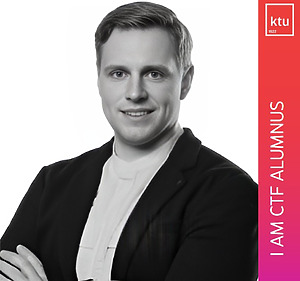Martynas Straukas, who is from Babtai, Kaunas district, knew from the 10th grade that he would choose to study chemistry. He did very well in these sciences. While participating in a part-time chemistry school, M. Straukas discussed with his fellow students the possible directions of choices and together with them came to the conclusion that there are strong food production companies in Lithuania. Choosing this particular specialty seemed like a rational and job-guaranteed decision M. Straukui. The alumnus didn’t hide that his grandmother worked in a dairy factory and she remembers it as the best years of her life.
– Did you always know what you wanted to study?
– Since the 10th grade, I knew that I would choose chemistry, because I did well in these sciences.
– What made you choose food technology studies? Was it wishful thinking? Or maybe the opportunity to dive into “unknown waters”?
– While participating in the part-time chemistry school, we discussed the possible directions of choices with our fellow students. Together with several like-minded people, we came to the opinion that strong food production companies and people will always need food in Lithuania. It turned out to be a rational and job-guaranteed specialty. Oh, and my grandmother, who once worked in a dairy factory, remembers this as her best years, so she was very supportive of my idea.
– How did you choose to study at KTU?
– The Department of Food Science and Technology of KTU has long been famous for the fact that it prepares food technologists and other specialists in this field in the best way. When asking acquaintances about those working in food processing companies, everyone unequivocally answered that they would choose KTU. To their knowledge, the strongest craftsmen, technologists, engineers and directors studied here. It isn’t only food production, but also engineering studies.
– What were the biggest challenges during your studies? What would you do differently if you were a first course student again?
– In the beginning, the most difficult thing was to reorientate from the school system to another system. In the school, everything is organized, one by one, the teachers make sure that you catch everything and catch up, it is easy to find time for extracurricular activities. At the university, you move to an independent system, you have to take care of everything yourself. There are many different activities and opportunities, you just need to choose what is most important to you and what schedule you will live with. When communicating, participating in various activities, you always get help from other students, and finally you help others yourself.
– How is the knowledge acquired at the university useful in everyday activities?
– Due to the wide spectrum of modules, the university has touched the entire perception in a wide way: it is easy to talk to IT specialists, you begin to understand how to act in certain situations and how to apply practical knowledge in everyday life. Currently, it is quite easy to talk to designers, economists, I can easily find the necessary information and perform the desired analysis. Civil engineering, mechanics and other modules, useful for reading blueprints at work and even building a house for yourself.


